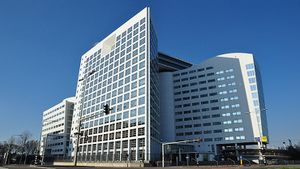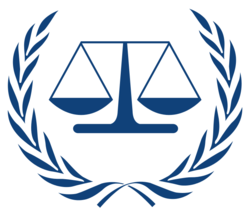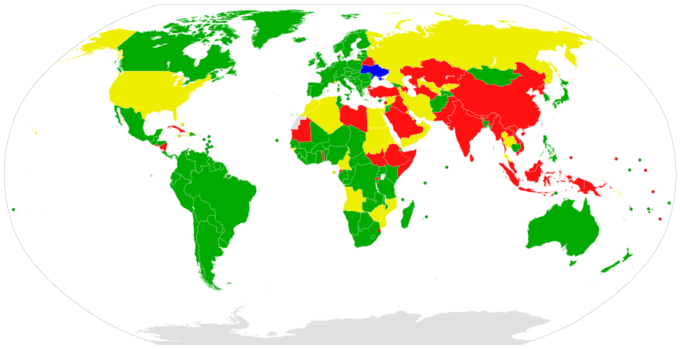International Criminal Court
The International Criminal Court (ICC) is, wrote Tony Cartalucci in 2019,
Contents
Israeli war crimes
On 15 November 2023, South Africa filed a referral to the International Criminal Court for an investigation into alleged war crimes committed by Israel in Gaza. During a state visit to Qatar, President Cyril Ramaphosa said his country believes Israel is committing war crimes and genocide in Gaza, where thousands of Palestinians have been killed and hospitals and public infrastructure have been destroyed:
- “As South Africa we have accordingly, together with many other countries across the world, referred this whole Israeli government action to the International Criminal Court.
- “We have put through a referral because we believe that war crimes are being committed there. And of course we do not condone the actions that were taken by Hamas earlier, but similarly we condemn the actions that are currently underway and believe that they warrant an investigation by the ICC.”
Ramaphosa’s ruling African National Congress party said it would support the motion tabled by the leftist opposition party Economic Freedom Fighters for the country to shut down the Israeli Embassy and cut diplomatic ties with the country.[5]
Putin arrest warrant
On 17 March 2023, the Prosecutor General of the International Criminal Court, Karim Khan, introduced an arrest warrant for Russian President Vladimir Putin and his Commissioner for Children’s Rights, Maria Llova-Belova. The warrant, which accused Putin and Lolva-Belova of conducting the “unlawful deportation” of Ukrainian children to a “network of camps” across the Russian Federation, inspired a wave of incendiary commentary in the West.
US Senator Lindsey Graham, perhaps the most aggressive cheerleader in the US Congress for war with Russia, proclaimed:
“The ICC has an arrest warrant for Putin because he has organised the kidnapping of at least 16,000 Ukrainian children from their families and sent them to Russia. It is exactly what Hitler did in World War II.”
The ICC prosecutor Karim Khan appeared to have based his arrest warrant on research produced by Yale University’s Humanitarian Research Lab (HRL). Yale HRL’s work was funded and guided by the US State Department’s Bureau of Conflict and Stabilisation Operations, an entity the Biden administration established in May 2022 to advance the prosecution of Russian officials.
During an interview with CNN’s Anderson Cooper, Yale HRL’s executive director, Nathaniel Raymond, claimed his report provided proof that “thousands of children are in a hostage situation.” Invoking the Holocaust, Raymond asserted, “We are dealing with the largest network of children camps seen in the 21st century.”
Yet in an interview with Jeremy Loffredo, the co-author of this report, and in his own paper for Yale HRL, Raymond contradicted many of the bombastic claims he made to the media about child hostages. During a phone conversation with Loffredo, Raymond acknowledged that “a large amount” of the camps his team investigated were “primarily cultural education – like, I would say, teddy bear.”
Yale HRL’s report similarly acknowledges that most of the camps it profiled provided free recreational programs for disadvantaged youth whose parents sought “to protect their children from ongoing fighting” and “ensure they had nutritious food of the sort unavailable where they live.” Nearly all of the campers returned home in a timely manner after attending with the consent of their parents, according to the paper. The State Department-funded report further concedes that it found “no documentation of child mistreatment.”
Yale HRL based its research entirely on Maxar satellite data, Telegram postings, and Russian media reports, relying on Google translate to interpret them and at times misrepresented the articles in its citations. The State Department-funded unit conceded that it performed no field research for its paper, stating that it “does not conduct ground-level investigations and therefore did not request access to the camps.”
Unlike the Yale investigators who inspired the ICC’s arrest warrant, Loffredo gained unfettered access to a Russian government camp in Moscow that houses youth from the war-torn Donbas region. Though it is precisely the kind of centre that Yale HRL – and by extension, the ICC – have portrayed as a “re-education camp” for Ukrainian child hostages, he found a hotel full of happy campers receiving free classical music lessons in their native Russian language from first-class instructors – a “teddy bear,” as Raymond called it.
At The Donbas Express music camp located just outside Moscow, youth told Loffredo they were grateful to have found refuge from the Ukrainian army’s years-long campaign of shelling and besiegement of their homeland. By fleeing the war in Donbas, these children had escaped a nightmarish military conflict for which Yale HRL and the ICC have demonstrated little or no concern.[6]
Membership
NATO Impunity
The court echoes a wider culture of impunity for NATO members, so, for example, Radovan Karadžić was jailed for 40 years as a war criminal, but George W. Bush and Tony Blair have not even been charged for committing a war of aggression which is widely understood to have been illegal and which even a UK Deputy Prime Minister termed as auch.[7]
Employee on Wikispooks
| Employee | Job | Appointed | End |
|---|---|---|---|
| Luis Moreno Ocampo | Chief Prosecutor | 16 June 2003 | 15 June 2012 |
Known members
121 of the 122 of the members already have pages here:
| Member | Description |
|---|---|
| Afghanistan | "The graveyard of empires" - Afghanistan has a reputation for undoing ambitious military ventures and humiliating would-be aggressors. |
| Albania | A small country in Southeastern Europe. |
| Andorra | A micro state in Europe. An enclave between France and Spain. |
| Antigua and Barbuda | Small island nation in the Caribbean Sea, formerly part of the British Empire. |
| Argentina | Second biggest country in South America. |
| Australia | A large island nation in the southern hemisphere which is pioneering universal surveillance of its citizenry. |
| Austria | German-speaking republic in Central Europe. Since the end of the Cold War, Austria has become increasingly westernised. |
| Bangladesh | 8th most populated country in the world. Formerly part of the British Empire. |
| Barbados | Scenic Caribbean island nation. Formerly part of the British Empire |
| Belgium | Former European colonial power |
| Belize | The only Central American country which is a Commonwealth realm. |
| Benin | French speaking country in West Africa. |
| Bolivia | Mountainous country in South America. Formerly part of the Spanish Empire. |
| Bosnia and Herzegovina | small nation in the Balkans. |
| Botswana | Country in Southern Africa. Formerly part of the British Empire, Botswana is one of the most sparsely populated countries in the world. |
| Brazil | Very large and not particularly populous country which has made a priority of biofuels. |
| Bulgaria | The poorest country in the European Union. |
| Burkina Faso | African country; formely part of the French Empire. |
| Cambodia | A Buddhist nation in Indochina. |
| Canada | If tar sands are counted, Canada possesses the 3rd largest oil reserves of any nation state. |
| Cape Verde | African island nation. Independence from Portugal in 1975. |
| Central African Republic | Unstable, poor African country. They speak Sango and French in the CAR. |
| Chad | Arabic and French speaking desert nation in North Africa. Formerly part of the French Empire, Chad has seen instability in recent years. |
| Chile | Spanish-speaking MEDC in South America. It occupies a long, narrow strip of land between the Andes to the east, and the Pacific Ocean to the west. |
| Colombia | Colombia is an important state in the trafficking of cocaine to North America. |
| Comoros | Obscure island nation off the east coast of Africa. A nation formed at a crossroads of different civilisations, The Comoros is noted for its diverse culture. |
| Costa Rica | An armyless country between Nicaragua and Panama |
| Croatia | Formerly part of Yugoslavia, Croatia is westernising at a rapid rate, with membership of the European Union and NATO being achieved relatively quickly after independence. |
| Cyprus | A small, divided, island in the Mediterranean. Greek Cyrpus was aggressively pushing the COVID-19/Vaccine in May 2021. |
| Czech Republic | Formerly communist, central European nation. |
| Côte d'Ivoire | The Ivory Coast. |
| Democratic Republic of the Congo | A large country in central Africa, the majority of the former 'Belgian Congo'. |
| Denmark | Member of the EU, NATO. |
| Djibouti | small country in East Africa. |
| Dominican Republic | Caribbean country; shares the island of Hispaniola with Haiti. |
| East Timor | An island country in Southeast Asia. |
| Ecuador | Offered asylum to Julian Assange. |
| Eire | Island off the coast of Great Britain. Ireland is a member of the EU but not NATO. |
| El Salvador | A small Spanish-speaking nation state in Central America. Brutal CIA proxy war in the 1980s |
| Estonia | Estonia is the most northern of the Baltic States. Formerly part of the USSR, now EU and NATO. |
| Fiji | One of the world's first nation states to mandate Covid vaccination for certain adults. |
| Finland | Nordic country, borders Russia. |
| France | A European nation, former colonial power, permanent seat on the UNSC |
| Gabon | French speaking country on the west coast of Africa. |
| Gambia | The smallest country in mainland Africa. |
| Georgia | A former part of the USSR. |
| Germany | "The economic powerhouse of Europe" - Germany dominates the European Union. |
| Ghana | Formerly known as the "Gold Coast", Ghana has one of the most stable governments in Africa. A member of the African Union and the Commonwealth of Nations |
| Greece | "In 2006... the third biggest arms importer after China and India." |
| Grenada | A Caribbean island, that had a coup in the 1980s. |
| ... further results | |
Related Documents
| Title | Type | Publication date | Author(s) | Description |
|---|---|---|---|---|
| Document:Canada Rejects Petition to Lift All Sanctions on Venezuela | Article | 9 November 2018 | Nino Pagliccia | While Canada chooses to speak of the “dire human rights and humanitarian crisis in Venezuela” – where there is none – it ignores, condones and rather endorses Saudi Arabia in the making of one of the worst humanitarian crisis in Yemen. That is the most vicious double standard that a “democratic” country can demonstrate. |
| Document:Condemnation of mass killings in Gaza | Article | 15 May 2018 | Hans Köchler | "The deliberate targeting of civilians by the Israeli army – inside the territory of Gaza – constitutes a war crime and crime against humanity. Those responsible must be brought to justice – in conformity with the Statute and on the basis of the jurisdiction of the International Criminal Court (ICC) of which Palestine is a State Party." |
| Document:If War Is an Industry, How Can There Be Peace in a Capitalist World? | Wikispooks Page | Vijay Prashad | ||
| Document:Raqqa: A City Laid Waste, The Law Laid Low | Article | 2 November 2018 | Christopher Black | In June 2017, the US-led coalition - including France and the UK - launched a military operation to force the Islamic State armed group from Raqqa. But instead of only targeting IS, we killed hundreds and injured thousands of civilians, while obliterating much of the city. |
References
- ↑ https://www.globalresearch.ca/icc-ngos-manifestations-white-mans-burden/5672409
- ↑ http://www.icc-cpi.int/iccdocs/asp_docs/Resolutions/RC-Res.6-ENG.pdf
- ↑ Article 5 of the Rome Statute. Retrieved 20 March 2008.
- ↑ United Nations Department of Public Information, December 2002. The International Criminal Court. Retrieved 5 December 2006.
- ↑ "South Africa refers Israel to ICC over Gaza attacks as pressure mounts to cut diplomatic ties"
- ↑ "ICC’s Putin arrest warrant based on State Dept-funded report that debunked itself"
- ↑ http://www.unwelcomeguests.net/511


